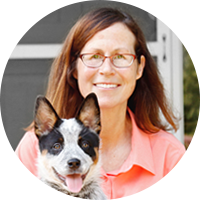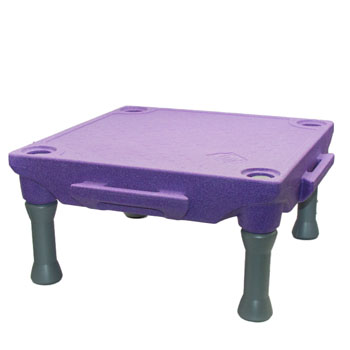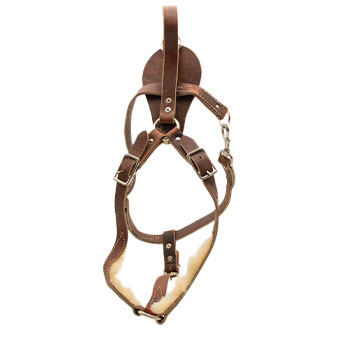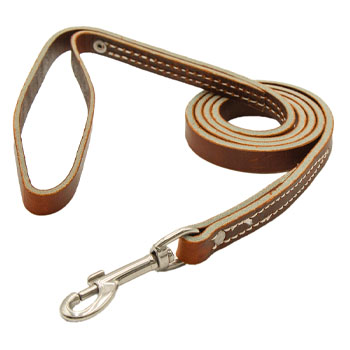May 17, 2011
What do you think of Koehler books?
Full Question:
I know you are busy but I would appreciate some feedback from you regarding treat rewards. I am currently training my two year old rott/shepherd mix, a family pet, and will soon start training a GSD for police work - I'm a deputy sheriff in Oregon.I've done my homework on many different types of training methods. Most seem to be useless for my purposes. I doubt a strong tempered/dominate dog would really respond to those types of training which are geared for the politically correct - which I am not a current member of!! (Nor ever will be!)
One of the methods that I've been very impressed with, and one that will get the results that I want - a dog that obeys my commands RIGHT NOW! - is the William Koelher methed. I did try this method but the preliminary work was extremely boring for both me and the dog.
I recently purchased your video on basic obedience training. I have to comment that I was very impressed with your methods. It is a very common sense approach to dog training - and I like common sense. (Apparently you are a reserve LEO so I'm sure you know what I mean.)
The one and only concern that I have with your method is using a treat during the first stages of teaching the dog a command. Will this have any negative effects in the long run? Am I going to end up with a dog that does not obey my commands RIGHT NOW!?
I guess what I am fishing for here is some thoughts from you on this matter - a little reassurance perhaps? I have been in contact with people who train dogs for the blind, etc. I have also contacted a representative of the Koelher method, who assured me that giving any treats during training will basically ruin the dog - more or less my interpretation of this person's answer.
I've switched my tactics and am using the methods you teach on my mix dog, with great results. He seems to enjoy the sessions and so do I. Not at all boring. I've also done some preliminary work with my GSD puppy using treats with equally positive results. I of course do not "correct" my puppy, who is 15 weeks old. It is a positive play session.
Anyway, I am thrilled that I happened onto your web site. The department that I work for requires us deputies that are "so bent" to obtain, train and obtain certification for our dogs. Yes we are a little behind times, but that's the way it is - and I love dogs so I'm willing to do whatever is necessary to have my own K9. I apprecitiate the fact that you offer the types of videos that you offer. I'll be able to train my dog from these videos.
Sincerely,
Robert

 Ed's Answer:
Ed's Answer:
Twenty five years ago I bought the Koehler books. At the time this was the only information available on this work. The books were my first experience with protection work, and at that time they made sense.
Over the years the training concepts have advanced light years ahead of Koehler, to the extent that his methods are on the same level as the model "T" ford. In my opinion if they took his books off the shelves at the book stores it would be better for dog training and dogs.
So with that in mind, you now understand how I think about whoever represents Koelhers books and training methods. They need to either get out of the business or come into the 21st century.
Dogs go through 3 phases in training:
The learning phase
The correction phase
The distraction phase
In the learning phase the handlers should use any motivations (fun) method the dog responds to. This means they should use food, a toy, exaggerated praise, or all of the above. To teach the dog the meaning of a command. We don't want to beat ( correct) a dog for not performing a command that he does not know. This is simply unfair and will destroy the relationship between the dog and his handler. Doing this (using the Koehler methods) is the reason dogs go out to do obedience and look like they would rather be anywhere else on earth than out there working with the handler.
If people want snappy obedience they need to learn what stimulates a dogs interest and use these methods. If a dog responds to food (and not all adult dogs do) then use it. If they respond to a toy then use it. The job of the handler is to find out what motivates his dog and then use that as a tool in the learning process.
For those people that say "If you use food the dog will always require food" - well - these people are not dog trainers. They don't understand the process.
Once the dog knows what a command is they are expected to mind when told to perform the command. If they do not they are corrected for not doing so. After a correction it is very important to praise the dog to show him that you still love him and respect him. He just needs to learn that you are the pack leader and you expect him to mind. New trainers fall down here because they do not praise enough. I go through all of this in my video Basic Dog Obedience.
After the correction phase, the dog then goes through the distraction phase. This is where the dog learns to respond in every circumstance - even when there are other dogs, kids, your wife, food bowl, or tennis ball laying on the ground in front of him. By raising the level of distractions as the training progresses (and always being ready to back up the training because you went to far to fast) you end up with a dog that is quick, happy and obedience. By setting up training scenarios where the dog sees a distraction (ie his favorite ball laying on the training field), and teaching him that the road to that ball is to perform an obedience exercise first the speed at which a dog works will go up and up. Part of the training will be to correct the dog to show him that he can not just run over and grab his ball without working.
Let me give an example. I use this exact process in training my police bite work. One of the exercises is to send your dog after a suspect who is standing 100 yards away screaming at you. Part way there you must either down your dog (as he is charging the man) or simply stop the dog and do a straight recall. This is a very very difficult exercise for a high drive trained police dog. The helper is a level 10 distraction for him.
The training begins with a long line. The dog is sent and before he gets to the end of the line he is told to down. If he does not do it he flips over backwards as he hits the end of the line. Once down he is called back to you and the very instant he reaches your side he is sent in for a bite. When we begin to see anticipation on the "down" we drop the long line and go to an electric collar to reinforce any mistakes.
In the end the dog learns that his road to the helper is to down, bark, then return to the handler on a recall. After he does all that he will be sent for a fight. When this light bulb goes off in the dogs head and he realizes that this is how the game is played the speed with which he returns is amazing.
As far as we are concerned, the helper stimulating the dog to try and provoke a fight is a distraction. It's no different that a hot dog for other breeds of dogs. The helper is a tool to distract the dog so we can force him to be obedience and mind.
So to say that you should not use food in training is stupid. You use what works to maintain drive and working attitude. Being consistent with your corrections and praise is the key.
Over the years the training concepts have advanced light years ahead of Koehler, to the extent that his methods are on the same level as the model "T" ford. In my opinion if they took his books off the shelves at the book stores it would be better for dog training and dogs.
So with that in mind, you now understand how I think about whoever represents Koelhers books and training methods. They need to either get out of the business or come into the 21st century.
Dogs go through 3 phases in training:
The learning phase
The correction phase
The distraction phase
In the learning phase the handlers should use any motivations (fun) method the dog responds to. This means they should use food, a toy, exaggerated praise, or all of the above. To teach the dog the meaning of a command. We don't want to beat ( correct) a dog for not performing a command that he does not know. This is simply unfair and will destroy the relationship between the dog and his handler. Doing this (using the Koehler methods) is the reason dogs go out to do obedience and look like they would rather be anywhere else on earth than out there working with the handler.
If people want snappy obedience they need to learn what stimulates a dogs interest and use these methods. If a dog responds to food (and not all adult dogs do) then use it. If they respond to a toy then use it. The job of the handler is to find out what motivates his dog and then use that as a tool in the learning process.
For those people that say "If you use food the dog will always require food" - well - these people are not dog trainers. They don't understand the process.
Once the dog knows what a command is they are expected to mind when told to perform the command. If they do not they are corrected for not doing so. After a correction it is very important to praise the dog to show him that you still love him and respect him. He just needs to learn that you are the pack leader and you expect him to mind. New trainers fall down here because they do not praise enough. I go through all of this in my video Basic Dog Obedience.
After the correction phase, the dog then goes through the distraction phase. This is where the dog learns to respond in every circumstance - even when there are other dogs, kids, your wife, food bowl, or tennis ball laying on the ground in front of him. By raising the level of distractions as the training progresses (and always being ready to back up the training because you went to far to fast) you end up with a dog that is quick, happy and obedience. By setting up training scenarios where the dog sees a distraction (ie his favorite ball laying on the training field), and teaching him that the road to that ball is to perform an obedience exercise first the speed at which a dog works will go up and up. Part of the training will be to correct the dog to show him that he can not just run over and grab his ball without working.
Let me give an example. I use this exact process in training my police bite work. One of the exercises is to send your dog after a suspect who is standing 100 yards away screaming at you. Part way there you must either down your dog (as he is charging the man) or simply stop the dog and do a straight recall. This is a very very difficult exercise for a high drive trained police dog. The helper is a level 10 distraction for him.
The training begins with a long line. The dog is sent and before he gets to the end of the line he is told to down. If he does not do it he flips over backwards as he hits the end of the line. Once down he is called back to you and the very instant he reaches your side he is sent in for a bite. When we begin to see anticipation on the "down" we drop the long line and go to an electric collar to reinforce any mistakes.
In the end the dog learns that his road to the helper is to down, bark, then return to the handler on a recall. After he does all that he will be sent for a fight. When this light bulb goes off in the dogs head and he realizes that this is how the game is played the speed with which he returns is amazing.
As far as we are concerned, the helper stimulating the dog to try and provoke a fight is a distraction. It's no different that a hot dog for other breeds of dogs. The helper is a tool to distract the dog so we can force him to be obedience and mind.
So to say that you should not use food in training is stupid. You use what works to maintain drive and working attitude. Being consistent with your corrections and praise is the key.
100% (17 out of 17)
respondents found this answer helpful


Can't find what you're looking for?







